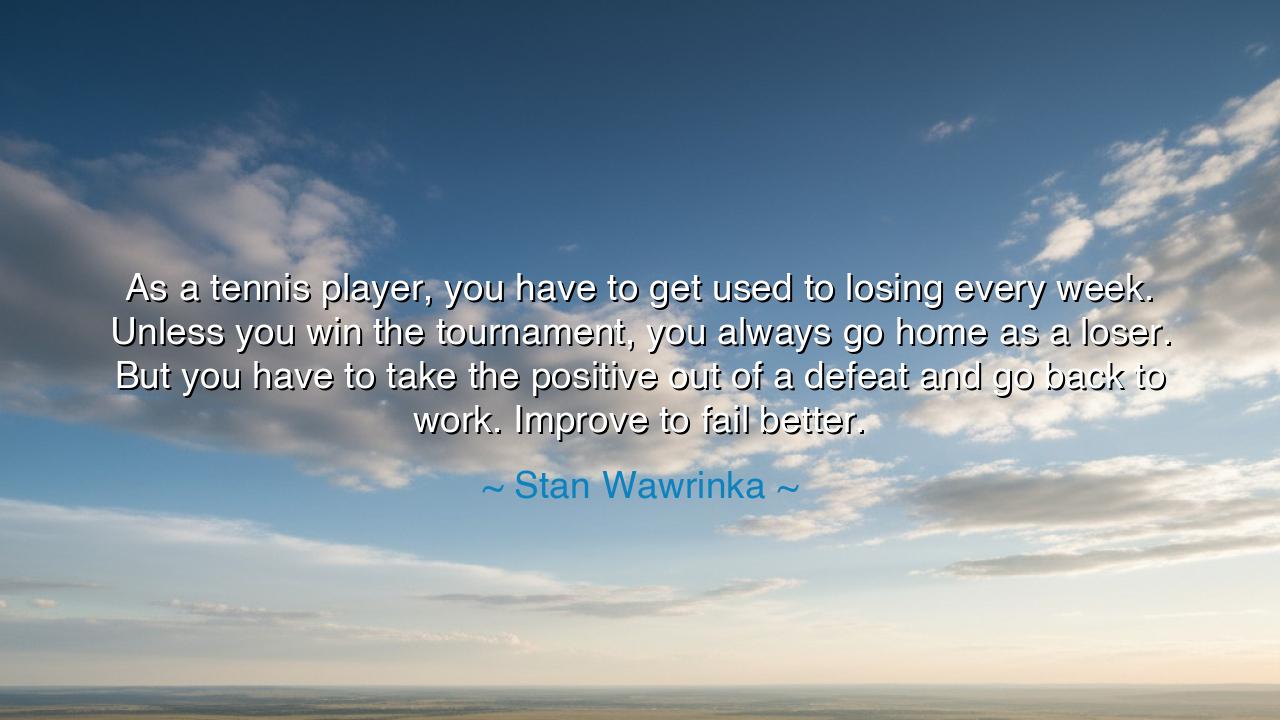
As a tennis player, you have to get used to losing every week.
As a tennis player, you have to get used to losing every week. Unless you win the tournament, you always go home as a loser. But you have to take the positive out of a defeat and go back to work. Improve to fail better.






In the powerful and humbling words of Stan Wawrinka, the Swiss champion forged in the crucible of competition, we find a truth as old as struggle itself: “As a tennis player, you have to get used to losing every week. Unless you win the tournament, you always go home as a loser. But you have to take the positive out of a defeat and go back to work. Improve to fail better.” Though these words are spoken of sport, they rise beyond it — they become a meditation on resilience, discipline, and the sacred art of perseverance. In them, we hear not merely the voice of an athlete, but the echo of every soul who has wrestled with failure and yet chosen to rise again.
To “get used to losing” is not to accept defeat — it is to understand that loss is the constant companion of greatness. In tennis, there is only one victor each week, and dozens who fall short. The same is true in life: for every success that shines in the light, there are countless efforts that perish unseen. Wawrinka’s wisdom lies in this recognition — that failure is not the opposite of victory, but its teacher. Only those who dare to lose, and lose again, may one day learn how to win. The ancients knew this truth well; the Spartans taught their children not to fear defeat, but to rise stronger from it. For each scar carried a lesson, and each wound was proof of courage.
When Wawrinka says, “You have to take the positive out of a defeat and go back to work,” he speaks to the sacred rhythm of growth — fall, rise, and refine. The ancient Stoics would have called this the path of virtue through adversity. Marcus Aurelius, emperor and philosopher, wrote in his meditations: “The obstacle is the way.” Every setback, every humiliation, becomes the very soil from which strength grows. The wise do not curse their misfortunes — they study them. They turn pain into preparation, and loss into wisdom. Wawrinka’s creed is thus an echo of this timeless truth: that perseverance is the mother of mastery, and humility the father of greatness.
The phrase “improve to fail better” is itself a treasure of meaning — it captures the eternal dance between progress and imperfection. No man or woman ever conquers all; even the greatest champions, the Federers, the Serenas, the Nadals, know that perfection is a mirage glimpsed, not possessed. To “fail better” is to refine the art of endurance, to make each failure a little more noble, a little more instructive. The Japanese samurai understood this principle in their own way — they spoke of kaizen, the discipline of constant improvement, knowing that mastery is not a destination but a pilgrimage. Every stroke of the blade, every fall in training, brought them closer not to flawlessness, but to wisdom through repetition.
History offers many mirrors to Wawrinka’s insight. Consider the story of Thomas Edison, who failed thousands of times before perfecting the lightbulb. When asked how he endured so many disappointments, he said, “I have not failed. I’ve just found ten thousand ways that won’t work.” Like Wawrinka, he understood that failure is not the end of the path but the path itself. The man who learns to greet failure as a teacher rather than an enemy becomes unstoppable. For such a man is no longer defeated by defeat — he transforms it into fuel.
The origin of Wawrinka’s quote lies in the brutal truth of professional sport, but its spirit belongs to all who labor toward mastery. In tennis, as in life, one cannot hide behind excuses or luck. The court is a mirror; it reflects only the truth of your preparation, your patience, and your perseverance. When Wawrinka speaks of “going home as a loser,” he does not lament — he accepts the eternal rhythm of the warrior’s journey: the endless cycle of trial and return. This humility, this willingness to begin again, is what makes his words timeless.
Let this be the lesson: to live well is to fail often, and to fail with purpose. Do not fear the sting of loss; fear instead the stagnation that comes from comfort. Each defeat, when embraced with honesty, brings you closer to strength. Each shortfall is a lesson carved into the soul. To improve to fail better is to acknowledge that the climb toward excellence never ends — and that the summit is not a single victory, but the endless striving toward something higher.
Action to take: when you stumble, do not retreat into shame or bitterness. Ask instead, “What has this defeat taught me?” Then rise and return to your work. Sharpen your craft. Strengthen your mind. Approach each new challenge not with the arrogance of perfection, but with the courage of persistence. For as Stan Wawrinka teaches, true greatness is not in never losing, but in the sacred art of losing wisely — of failing better, until failure itself becomes the forge from which victory is born.






AAdministratorAdministrator
Welcome, honored guests. Please leave a comment, we will respond soon